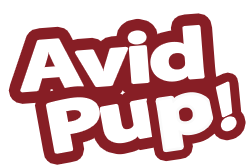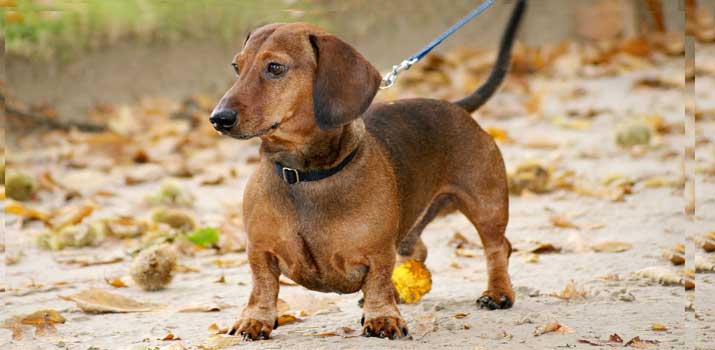
Affectionately referred to as the “Weiner Dog” in some circles, Dachshunds are one of the most beloved breeds around!
Known for their playful attitudes and constant supply of energy, they are lively pups that are always down for a good play session. They make great family pets and are more than willing to be lap dogs, too!
While these dogs get a lot of attention for their unique bodies, their iconic profile can also be a detriment. These pups have long slender bodies with very short and stubby legs.
Thanks to their elongated spines, these dogs are at risk for several health issues.
If you own a Dachshund, you have to be more vigilant about their health. A big part of that is providing the best dog food possible.
What your pup eats every day plays a big part in their overall health. While many ailments are unavoidable, the right food can reduce symptoms and help your pup live comfortably.
The dog food market these days is quite vast. Thus, you’re going to have to do your homework before finding the best dog food for your Dachshund.
To help make things easier, we’ve rounded up a collection of high-quality food products for Dachshund puppies, adults, and seniors.
7 of the Best Dog Foods for Dachshunds in Order of Lifestage
Best for Dachshund Puppies
1. Royal Canin Dachshund Puppy Dry Dog Food
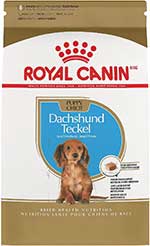
What’s better for a Dachshund puppy than a diet that’s specifically formulated for the breed? This recipe from Royal Canin is tailor-made to meet the needs of growing Dachshunds.
It has the right amount of protein and beneficial supplements to support your pup’s growth. This includes calcium and phosphorus.
Beyond that, this food has prebiotics. They help to balance out your pup’s digestive tract by introducing beneficial gut flora.
The food also has a nice blend of antioxidants. Ingredients like fish oil contain omega fatty acids to support your dog’s immune system while also making their coat nice and healthy.
2. Hill’s Science Diet Puppy Small Paws Chicken Meal, Barley & Brown Rice Dry Dog Food
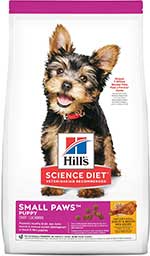
From Hill’s Science is this small breed puppy formula. It contains approximately 24.5 percent protein. That high protein content gives your puppy plenty of energy while also supporting their growing muscles.
You’ll also find a nice blend of antioxidants and vitamins. Vitamin E and Vitamin C, in particular, work to strengthen your dog’s immune system.
Meanwhile, the inclusion of fish oil introduces DHA into your Dachshund’s system. DHA can help support brain development while also keeping your pup’s eyes in good shape.
Best for Dachshund Adults
3. Royal Canin Dachshund Adult Dry Dog Food
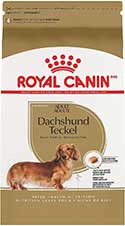
Here’s another excellent option from Royal Canin. Like the puppy formula, this recipe is made for the Dachshund breed. It has a lower protein content than the puppy food. However, it’s still very high at 26 percent.
One of the biggest benefits of this formula is digestibility. The recipe is made up of about 4.1 percent fiber. This fiber helps to keep your dog’s gut in good shape.
A mix of digestive proteins and carbohydrates can benefit your dog’s system as well.
4. Wellness Small Breed Complete Health Adult Turkey & Oatmeal Recipe Dry Dog Food
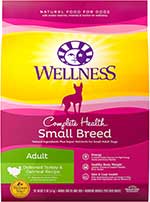
This small breed formula from Wellness has everything your Dachshund needs to stay healthy. With roughly 28 percent protein, it can maintain your dog’s muscles.
Most of that protein comes from high-quality sources like deboned turkey, chicken meal, and salmon meal.mTo tackle joint issues, this kibble also has a nice dose of chondroitin. It works to maintain your dog’s joints before they start suffering from symptoms of arthritis.
For good measure, Wellness has thrown in plenty of vitamins to support your dog’s immune system as well.
5. Ziwi Peak Air-Dried Lamb Dog Food (Great for dachshunds with skin allergies)
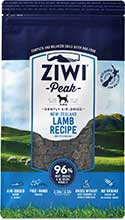
If your dog is suffering from allergies, this Ziwi food is a great option. It has very limited ingredients. Most of the protein, which makes up 35 percent of the recipe, comes from lamb meat and organs.
The lamb comes from a single source that doesn’t use antibiotics or growth hormones.
Thanks to its limited use of ingredients, this food is highly digestible. You won’t find any common allergens in the ingredients list. It’s free of corn, soy, wheat, and other unnecessary fillers.
Best for Dachshund Seniors
6. Merrick Lil’ Plates Grain-Free Real Chicken & Sweet Potato Senior Dry Dog Food
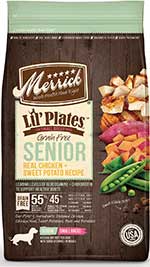
This grain-free formula from Merrick has only the best for your senior dog. The very first ingredient is deboned chicken. In total, protein makes up 32 percent of the recipe.
Your dog will also consume a nice blend of vegetables and fruits. They provide some much-needed vitamins and nutrients. There are a few ingredients that work to support your dog’s aging body. For example, Merrick uses glucosamine and chondroitin for joint health.
There’s also prebiotic fiber for easy digestion. What you won’t find are grain-based ingredients, unnecessary fillers, or artificial additives.
7. Ultra Senior Dry Dog Food
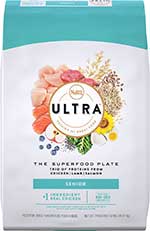
The Nutro Ultra Senior dog food is great for aging Dachshunds. The recipe utilizes lean protein sources. You’ll find farm-raised chicken meat, pasture-fed lamb meat, and salmon.
These meats work to provide a complex array of amino acids to support your dog’s muscles. Together, they make up about 26 percent of the formula.
Of course, no senior dog food is complete without some supplements. Nutro uses naturally-sourced glucosamine and chondroitin.
There’s also a healthy dose of calcium for the bones and fiber to keep the digestive system in check.
What to Look for in Dachshund Dog Foods
It’s not enough to rely on marketing and basic labeling when choosing your pup’s food. You need to take a look at the ingredients list and nutrient analysis.
Scrutinize every food you consider to ensure that it has everything your pup needs. Here are some things to look for as you shop.
High-Quality Proteins
The most important thing in your dog’s food should always be protein! Dogs require a protein-rich diet to stay healthy. It supports their muscles and keeps them active.
At the very least, your Dachshund’s food should be made up of approximately 18 percent protein. That’s the bare minimum. We always recommend going with a food that has even more.
A higher protein content means that most of the recipe is comprised of meat-based ingredients, which closely resembles the diet of a wild dog.
Look out for wholesome sources like chicken, beef, and fish. More variety in the recipe is always a good thing. Having multiple sources of protein ensures that your pup is getting a nice array of amino acids in their system!
Natural Ingredients
In addition to the protein source, look for natural ingredients. Commercial dog foods are highly processed as it is. The last thing you want is to provide dog food that’s made up of artificial stuff!
Keep things natural to give your dog all the nutrients and vitamins they need.
Look for easy-to-identify fruits and vegetables. Your dog can benefit from all kinds of plant-based ingredients. Go for vitamin-rich foods like sweet potatoes, carrots, and kale.
Good Digestibility
To address your dog’s digestive issues, look for dog foods with ingredients that can improve the digestion process. You can easily find foods that are fortified with prebiotics.
These foods introduce healthy gut bacteria in your pup’s system. Over time, you may notice fewer instances of diarrhea!
Additionally, look out for good fiber sources. These include sweet potatoes, peas, and whole grains. The fiber will help clean out your pup’s system.
Related: Best Dog & Puppy Food to Make Fido Poop Less
Beneficial Supplements
Dachshunds can benefit greatly from supplements. One of the most important is calcium. Calcium will help to keep the bones strong.
For puppies, keep an eye out for foods with both calcium and phosphorus. Those two supplements can regulate bone growth and ensure that your puppy’s body develops appropriately.
As your dog gets older, you might want to look for foods with supplements that help the joints! This includes glucosamine and chondroitin.
Good Manufacturing Processes
You’re not going to find any information about the manufacturing process on the bag’s label. However, you can often find where the food was manufactured.
Use this as your guide! Always stick to foods that are made in countries that have strict manufacturing guidelines.
Choosing food that’s manufactured in the United States is always a good choice. The same goes for countries with similar standards, such as Canada, Australia, and New Zealand.
What to Avoid
As you’re perusing your choices, you’ll see a ton of options that look good at face value. However, once you start digging deeper, you’ll notice a lot of red flags!
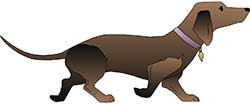
The biggest is the use of artificial ingredients. Artificial flavors, colors, and preservatives are a bit no-no!
There’s no reason why your pup needs to be eating synthetic ingredients like that.
If the ingredients are high quality, artificial ingredients and colors are just unnecessary.
As for the preservatives, there are natural alternatives available. Mixed tocopherols, for example, do a fine job of keeping food in good shape without the need for chemical additives.
Another thing you’ll want to avoid is cheap fillers. Low-cost dog foods use ingredients to bulk up the food.
Unfortunately, they don’t offer any substance when it comes to nutritional content. Many of those filler ingredients are difficult for dogs to digest!
Avoid fillers like corn, wheat, or soy.
Finally, there are mystery meats. Another commonly used ingredient for cheap foods, mystery meats include anything that’s not clearly defined.
For example, you might see something like a byproduct meal. These ingredients come from questionable sources.
Oftentimes, they are slaughterhouse leftovers that aren’t fit for human consumption. Unfortunately, these ingredients don’t provide a ton of nutritional benefits.
Not only that, but they could be contaminated with chemicals or disease.
How Much Food Does a Dachshund Need?
Once you’ve found the right food, you need to make sure that you’re providing enough of it! Most healthy Dachshunds will need between 800 and 900 calories every day.
This should be split up into two smaller meals.
There’s no exact calorie amount to follow. You must consider your pup’s lifestyle and body condition to get things just right.
More active dogs are going to require a bit more food to stay healthy than those that lay around all day!
Consult with your vet and pay attention to your pup’s condition. You should adapt to your dog’s needs change.
Now, puppies will need more calories than adults.
Generally, puppies do well with about 1,000 calories every day. They’re going through a growth spurt! Thus, those extra calories will support their changing bodies.
On the opposite side of the spectrum, you have senior dogs.
Most Dachshunds slow down quite a bit as they reach the final years of life. You’ll want to lower their caloric intake to ensure that they don’t gain weight.
About the Dachshund Breed
They might be known as housepets now, but Dachshunds were originally bred for hunting!
This breed has a long history that dates back to the 15th century. However, the breed we know today was developed by German breeders during the 17th century.
Breeders mixed several types of hounds and terriers to create a dog that was built for hunting small prey. They assisted hunters to find everything from rabbits to badgers.
Thanks to their small size, they were particularly effective at flushing out burrowing animals.
Back then, Dachshunds were a bit bigger than pups you see today. The breed continued to change until official breed standards were established.

Today, most Dachshunds weigh between 16 and 32 pounds when fully grown. Smaller variations exist as well. For example, the Miniature Dachshund weighs 11 pounds or less.
Potential Health Concerns
As we mentioned earlier, Dachshunds are prone to a bevy of health concerns. While no dog owner wants to imagine their pup dealing with pain and disease, it’s a fact of life.
No dog is perfectly healthy. Sadly, these health concerns come with the territory when you own a Dachshund.
The best thing you can do is to support your Dachshund’s health as well as possible.
A solid dog food choice isn’t going to make these concerns disappear. But, they may be able to put some of those issues off or help your dog get relief.
At the very least, investing in top-notch dog food will help you rest easy knowing that it won’t make those health problems worse!
Here are some of the major afflictions that affect Dachshunds.
Invertebral Disc Disease
Dachshunds have a longer spine that most dogs in their size class. As a result, they have a high risk of injury. These pups are known to experience back injuries pretty frequently.
With invertebral disc disease, discs in the spine can become ruptured or herniated. This causes the contents of the spinal cord to leak out and wreak havoc on your pup’s body.
This can lead to debilitating pain. Pups who suffer from this condition need immediate medical attention. The pain can be so bad that dogs don’t even want to walk.
Arthritis and Joint Problems
Interestingly enough, all Dachshunds actually suffer from a form of dwarfism. As a result, the joints are prone to experiencing all kinds of problems.
Not only can they become malformed, but the constant friction and pressure will wear them down with time.
Dachshunds can suffer from severe arthritis. While it’s most noticeable in older dogs, younger pups can experience symptoms, too.
Hip Dysplasia
Hip Dysplasia is related to the hip joint. The joint and socket become malformed, which often leads to lameness in the rear legs.
This is often a genetic condition. However, symptoms can be exacerbated due to poor bone development when the dog is younger.
Patellar Luxation
Thanks to the Dachshunds stubby legs, patellar luxation is very common with this breed.
With patellar luxation, the knee caps pop out frequently. This is a painful occurrence that can cause limping.
In severe cases, something as simple as getting up can cause the knee cap to get out of place.
Obesity
All small dogs are prone to obesity. With their voracious appetites, you have to be careful about overfeeding these dogs. For Dachshunds, obesity causes even bigger problems.
Excess weight around the midsection puts too much strain on the spine, leading to more pressing health concerns.
Skin Issues
Many Dachshunds suffer from skin problems at some point. For some dogs, it’s a chronic issue caused by genetics. Whether it’s rashes or flaky skin, you can easily use food to keep symptoms at bay.
Limited-ingredient foods that are rich in omega fatty acids do best.
Ocular Problems
Your pup can start to experience eye problems as they age. Some common conditions include progressive retinal atrophy and cataracts.
For both of those conditions, light sensitivity is common. It’ll affect their ability to see and can eventually lead to total blindness.
Urinary Tract Issues
Urinary tract infections and stones are common with Dachshunds. In these cases, you might have to alter your dog’s diet and provide ongoing medications to keep things under control.
Gastrointestinal Concerns
Dachshunds often experience digestive problems. Food sensitivities and a weak digestive system result in frequent diarrhea.
Your pup may also have issues emptying their anal glands, which can be a messy problem that you’ll need to deal with frequently.
Conclusion
While it’s impossible to make all of your dog’s potential health problems go away, choosing the right food can make a big difference. T
he best dog foods for Dachshunds will support your dog’s health and give them everything they need to live long and happy lives. What more could you want?
Also Read: 5 Best Non Prescription Low Fat Dog Food Brands

